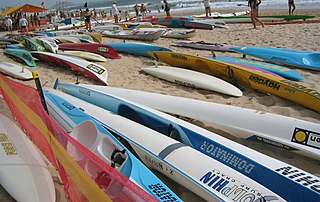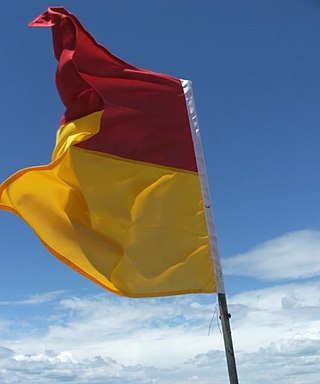
Surf lifesaving is a multifaceted social movement that comprises key aspects of voluntary lifeguard services and competitive surf sport. Originating in early 20th century Australia, the movement has expanded globally to other countries, including New Zealand, Ireland, South Africa, and the United Kingdom. Surf lifesavers in Australia are colloquially known as "Clubbies".

A lifeguard is a rescuer who supervises the safety and rescue of swimmers, surfers, and other water sports participants such as in a swimming pool, water park, beach, spa, river and lake. Lifeguards are trained in swimming and CPR/AED first aid, certified in water rescue using a variety of aids and equipment depending on requirements of their particular venue. In some areas, lifeguards are part of the emergency services system to incidents and in some communities, lifeguards may function as the primary EMS provider.

Piha is a coastal settlement in West Auckland, on the western coast of the Auckland Region in New Zealand. It is one of the most popular beaches in the area and a major day-trip destination for Aucklanders throughout the year, and especially in summer.

Karekare is a small coastal settlement in West Auckland, New Zealand, sandwiched between the Waitākere Ranges and a large black sand surf beach.

In surf lifesaving, long boats, called surf boats, while no longer used for rescues, remain one of the most popular events at surf lifesaving carnivals. The boats weigh between 180 and 250 kilograms and are crewed by four rowers and a sweep.
Surf Life Saving Northern Region is the largest of four regions that make up Surf Life Saving New Zealand. As of the 2021/2022 season, it is made up of 18 clubs that look after 22 patrol locations from Ahipara to Raglan on the West Coast and from Whangārei Heads to Takapuna on the East Coast.

Surf Life Saving New Zealand (SLSNZ) is the national association representing 74 Surf Life Saving Clubs in New Zealand. The organisation's motto is 'In it for Life'. This refers to both the long relationship many members have with the organisation, as well as to the organisation's purpose of preventing drowning and injury, thereby saving lives.

Inflatable Rescue Boats (IRBs) are rubber boats with an outboard motor used in surf lifesaving. IRBs have been used for all forms of surf rescue, retrieval, and service by Surf Lifesaving in New Zealand, Australia, and Del Mar, California since the late 1980s.

Piha Surf Life Saving Club is a surf lifesaving club for the southern section of Piha, on the west coast of Auckland, New Zealand, some 45 km from the Auckland City centre. The patrol was featured in the TVNZ reality show Piha Rescue.

The International Life Saving Federation (ILS) is an organisation for drowning prevention, water safety, lifesaving and lifesaving sports.

The United States Lifesaving Association is a nonprofit professional association of beach lifeguards and open water rescuers in the United States.

The Auckland Westpac Rescue Helicopter is a New Zealand accident and emergency rescue and transport service operated by the Auckland Rescue Helicopter Trust (ARHT). The trust operates two AW169 and one BK117 helicopters on behalf of the helicopter owners—the greater Auckland community. There are four "Westpac Rescue Helicopter" services in New Zealand, but they are all separate entities and only linked by the same major sponsor.

Surf Life Saving Australia (SLSA) is an Australian not-for-profit community organisation that promotes water safety and provides surf rescue services.

Lifesaving is the act involving rescue, resuscitation and first aid. It often refers to water safety and aquatic rescue; however, it could include ice rescue, flood and river rescue, swimming pool rescue and other emergency medical services. Lifesaving also refers to sport where lifesavers compete based on skills, technique, speed and teamwork. Lifesaving activities specialized in oceanic environment is called surf lifesaving or coastal lifesaving.

Bondi Rescue is an Australian factual television program which is broadcast on Network 10. The program follows the daily lives and routines of the Waverley Council professional lifeguards who patrol Bondi Beach.
A rescue lifeboat is a boat rescue craft which is used to attend a vessel in distress, or its survivors, to rescue crew and passengers. It can be hand pulled, sail powered or powered by an engine. Lifeboats may be rigid, inflatable or rigid-inflatable combination-hulled vessels.

Karioitahi Beach is a black sand beach located in the southwest of the Auckland region, on the west coast of New Zealand's North Island. The nearest major town is Waiuku, about 8 km inland.
Mark Trevor "Horse" Bourneville is a New Zealand former professional rugby league footballer. He represented both New Zealand and France in international rugby league and is the only dual-international the two countries share.

New Zealand is a popular surfing destination, with a long history of the sport and a varied coastline with locations suitable for all types of surfing. The West coast is notably consistent, with big swells and high winds, whereas the east coast is dominated by cyclone season swells; the North island is notably warmer than the South, but less consistent; mean temperatures range from 7 °C to 20 °C, depending on location and time of year. Winter is more consistent than Summer, with a southeasterly swell. The climate of New Zealand is varied, so different surf conditions are encountered across the islands.
The Freshwater Surf Life Saving Club, established in 1908, is located at Freshwater Beach in Australia. It has become a large volunteer organization with strong community bonds. The club was founded by a push from government to foster safer beach practices. It is a part of Surf Life Saving Australia, a not-for-profit organization committed to keeping the beach safe for patrons and providing beach rescue services. A visit to the club from United States' surfer, Duke Kahanamoku, in 1914 helped initiate the sport of surfing in Australia.
















